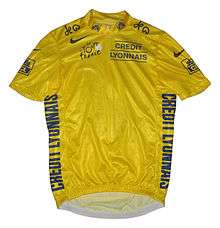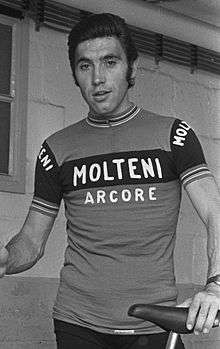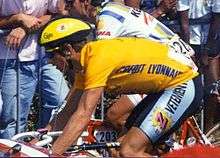Yellow jersey statistics

Since the first Tour de France in 1903, there have been 2,100 stages, up to and including the 2016 Tour de France. Since 1919, the race leader following each stage has been awarded the yellow jersey (French: Maillot jaune).
Although the leader of the classification after a stage gets a yellow jersey, he is not considered the winner of the yellow jersey, only the wearer. Only after the final stage, the wearer of the yellow jersey is considered the winner of the yellow jersey, and thereby the winner of the Tour de France.
In this article first-place-classifications before 1919 are also counted as if a yellow jersey was awarded. There have been more yellow jerseys given than there were stages: In 1914,[1] 1929,[2] and 1931,[3] there were multiple cyclists with the same leading time, and the 1988 Tour de France had a "prelude",[4] an extra stage for a select group of cyclists. As of 2016, 2,103 yellow jerseys have been awarded in the Tour de France to 283 different riders.
Individual records

Key:
| Cyclists who are still active |
| Cyclists who won the Tour de France |
In previous tours, sometimes a stage was broken in two (or three). On such occasions, only the cyclist leading at the end of the day is counted. The "Jerseys" column lists the number of days that the cyclist wore the yellow jersey; the "Tour wins" column gives the number of days that the cyclist won the yellow jersey. The next four columns indicate the number of times the rider won the points classification, the King of the Mountains classification, and the young rider competition, and the years in which the yellow jersey was worn, with bold years indicating an overall Tour win. For example: Eddy Merckx has spent 96 days in the yellow jersey, won the general classification five times, won the points classification three times, won the mountains classification two times, and never won the young rider classification.[5] He wore the yellow jersey in the Tours of 1969, 1970, 1971, 1972, 1974 (which he all won) and 1975 (which he did not win).
Three cyclists (Jean Robic in 1947, Charly Gaul in 1958 and Jan Janssen in 1968) have won the Tour de France with only two yellow jerseys in their career.
Fabian Cancellara is, as of 2015 with twenty nine days in yellow, the rider with the most yellow jerseys ever for someone who has not won the Tour. The four active Tour de France winners Chris Froome, Vincenzo Nibali, Bradley Wiggins, and Alberto Contador rank 5th, 21st, 34th, and 53rd with forty-four, nineteen, fourteen and eleven days in yellow respectively.
Until the results of Lance Armstrong were annulled for cheating late 2012, he was ranked second in this list, leading the Tour for 83 stages from 1999 to 2005.
Number of wearers per year
The largest number of different riders wearing the yellow jersey in any year is 8. The smallest is 1.
| Number of wearers | Years |
|---|---|
| 1 | 1903, 1924, 1928, 1935, 1999 |
| 2 | 1905, 1906, 1908, 1909, 1914, 1920, 1921, 1925, 1934, 1961, 1970, 1972, 1977, 2005, 2012 |
| 3 | 1907, 1910, 1911, 1912, 1919, 1926, 1930, 1932, 1933, 1954, 1965, 1971, 1974, 1975, 1976, 1981, 1982, 1985, 2000, 2002, 2009, 2014 |
| 4 | 1904, 1923, 1927, 1936, 1939, 1948, 1950, 1960, 1969, 1973, 1979, 1989, 1992, 1993, 1997, 2003, 2004, 2007, 2010, 2015, 2016 |
| 5 | 1913, 1922, 1938, 1947, 1952, 1955, 1957, 1963, 1964, 1980, 1990, 1991, 1994, 1996, 2001, 2011, 2013 |
| 6 | 1929, 1931, 1937, 1953, 1956, 1959, 1966, 1967, 1983, 1984, 1988, 1995, 2008 |
| 7 | 1949, 1951, 1962, 1968, 1978, 1986, 1998, 2006 |
| 8 | 1958, 1987 |
Notes
- 1 2 3 In 1929, Nicolas Frantz (LUX), André Leducq (FRA) and Victor Fontan (FRA) were all three declared leader after the 7th stage.[2]
- 1 2 In 1914, Philippe Thys and Jean Rossius were both declared leader for 4 days.[1]
- ↑ In 1988, on 19 July, there were two stages. Other than the split stages that the Tour de France saw earlier, these two stages were counted as individual stages, so Pedro Delgado received two yellow jerseys on that day.
- ↑ Before Alberto Contador's 2010 Tour de France victory and days in yellow were officially removed, he wore the yellow jersey for 6 days. After his disqualification, Andy Schleck's total increased with 6 extra days.
- ↑ Before Floyd Landis' 2006 Tourde France victory and days in yellow were officially removed, he wore the yellow jersey for 5 days. After his disqualification, Óscar Pereiro's total increased with 2 extra days.
- 1 2 In 1931, Charles Pélissier (FRA) and Raffaele Di Paco (ITA) were both declared leader after the 5th stage.[3]
- ↑ Jan Raas won the prologue of the 1978 Tour de France. Because the weather changed dramatically during that prologue, the race was invalidated, and Raas was not awarded a yellow jersey.[6] In cycling statistics lists, including the official database from the Tour de France organisation,[7] the victory is awarded to Jan Raas, so this is also done in the list above.
- ↑ In 1988, the Tour de France started with a prelude, a 1km time trial in which one cyclist from every team could compete. This prelude was won by Guido Bontempi, who wore the yellow jersey on the first real stage of the 1988 Tour.[4]
Per country
The yellow jersey has been awarded to 23 different countries since 1903. In the table below, "Jerseys" indicates the number of yellow jerseys that were given to cyclists of each country. "Tour wins" stands for the number of tour wins by cyclists of that country,[8] "Points" for the number of times the points classification was won by cyclist of that country,[9] "KoM" for the number of times the mountains classification in the Tour de France was won by a cyclist of that country,[10] and "Young rider" for the number of times the young rider classification was won by a cyclist of that country.[11] The "Most recent" column shows the cyclist of the country that wore the yellow jersey most recently. The "Different holders" column gives the number of different cyclists of the country that wore the yellow jersey.
| Rank | Country | Yellow Jerseys | Tour Wins | Points | KoM | Young rider | Most recent cyclist | Most recent date | Different holders |
|---|---|---|---|---|---|---|---|---|---|
| 1 | 709 | 36 | 9 | 20 | 7 | Tony Gallopin | 2014, stage 9 | 94 | |
| 2 | 426 | 18 | 19 | 11 | 0 | Greg Van Avermaet | 2016, stage 7 | 60 | |
| 3 | 208 | 10 | 2 | 12 | 5 | Vincenzo Nibali | 2014, stage 21 | 28 | |
| 4 | 135 | 12 | 1 | 16 | 5 | Alberto Contador | 2009, stage 21 | 12 | |
| 5 | 96 | 5 | 0 | 2 | 3 | Andy Schleck | 2011, stage 19 | 10 | |
| 6 | 75 | 1 | 8 | 0 | 4 | Tony Martin | 2015, stage 6 | 15 | |
| 7 | 74 | 2 | 2 | 1 | 0 | Fabian Cancellara | 2015, stage 2 | 9 | |
| 8 | 72 | 2 | 4 | 2 | 5 | Erik Breukink | 1989, prologue | 16 | |
| 9 | 71 | 4 | 1 | 2 | 1 | Chris Froome | 2016, stage 21 | 7 | |
| 10 | 43 | 1 | 0 | 2 | 0 | Michael Rasmussen | 2007, stage 16 | 6 | |
| 11 | 33 | 1 | 4 | 0 | 1 | Rohan Dennis | 2015, stage 1 | 7 | |
| 12 | 26 | 3 | 0 | 0 | 3 | George Hincapie | 2006, stage 1 | 3 | |
| 13 | 15 | 0 | 0 | 0 | 0 | Steve Bauer | 1990, stage 9 | 2 | |
| 14 | 10 | 0 | 2 | 0 | 0 | Thor Hushovd | 2011, stage 8 | 1 | |
| 15 | 7 | 1 | 4 | 0 | 0 | Stephen Roche | 1987, stage 25 | 3 | |
| 16 | 6 | 0 | 0 | 0 | 0 | Jaan Kirsipuu | 1999, stage 7 | 1 | |
| 17 | 4 | 0 | 0 | 0 | 0 | Acácio da Silva | 1989, stage 4 | 1 | |
| = 18 | 3 | 0 | 0 | 5 | 4 | Víctor Hugo Peña | 2003, stage 6 | 1 | |
| = 18 | 3 | 0 | 5 | 0 | 0 | Peter Sagan | 2016, stage 4 | 1 | |
| = 18 | 3 | 0 | 0 | 0 | 1 | Serhiy Honchar | 2006, stage 9 | 1 | |
| = 20 | 2 | 0 | 0 | 2 | 0 | Lech Piasecki | 1987, stage 2 | 1 | |
| = 20 | 2 | 0 | 0 | 0 | 2 | Eugeni Berzin | 1996, stage 8 | 1 | |
| = 20 | 2 | 0 | 0 | 0 | 0 | Daryl Impey | 2013, stage 7 | 1 | |
| = 23 | 1 | 0 | 0 | 0 | 0 | Max Bulla | 1931, stage 2 | 1 | |
| = 24 | 0 | 0 | 3 | 0 | 0 | – | 0 | ||
| = 24 | 0 | 0 | 0 | 0 | 1 | – | 0 |
Yellow jersey retirees
Sixteen riders have quit the Tour while wearing the yellow jersey.[12]
| Year | Stage | Rider | Reason |
|---|---|---|---|
| 1927 | 6 | Sickness | |
| 1929 | 10 | Broken bicycle | |
| 1937 | 16 | Collective withdrawal of the Belgian team due to threat of French spectators | |
| 1950 | 11 | Collective withdrawal of the two Italian teams due to threat of French spectators | |
| 1951 | 13 | After a fall in a ravine in Aubisque | |
| 1965 | 9 | Withdrawal in the climb of Aubisque (sunstroke) | |
| 1971 | 14 | Fall during a storm in Col de Mente | |
| 1978 | 16 | Expelled for fraud attempt in doping test | |
| 1980 | 12 | Knee pain | |
| 1983 | 17 | Scapula fracture | |
| 1991 | 5 | Clavicle fracture after fall in the last kilometer | |
| 1996 | 7 | Knee tendinitis | |
| 1998 | 2 | Head and neck injury after a severe crash | |
| 2007 | 16 | Fired by his team due to lying about his whereabouts | |
| 2015 | 4 | Broken vertebrae in stage 3 crash | |
| 2015 | 7 | Broken collarbone in stage 6 crash[13] |
Yellow jersey winners without winning any stage

Usually the winner of the Tour de France also wins a stage, but that is not necessary. It is possible to be the winner of the Tour de France without winning a stage, because the Tour de France is decided by the total raced time. This has happened six times so far:[14]
.svg.png) Firmin Lambot (BEL) 1922
Firmin Lambot (BEL) 1922 Roger Walkowiak (FRA) 1956
Roger Walkowiak (FRA) 1956 Gastone Nencini (ITA) 1960
Gastone Nencini (ITA) 1960 Lucien Aimar (FRA) 1966
Lucien Aimar (FRA) 1966 Greg LeMond (USA) 1990
Greg LeMond (USA) 1990 Óscar Pereiro (ESP) 2006
Óscar Pereiro (ESP) 2006
Of these six cyclists, Walkowiak is the only one never to win a Tour stage at all.[15] (Firmin Lambot won stages in the 1913, 1914, 1919, 1920 and 1921 Tours),[16] Gastone Nencini won stages in the 1956, 1957 and 1958 Tours,[17] Aimar won a stage in the 1967 Tour,[18] LeMond won stages in the 1985, 1986 and 1989 Tours,[19] Pereiro won a stage in the 2005 Tour.[20] Alberto Contador initially also belonged to this group, when he won the 2010 Tour de France; however he was later stripped of this title.
Number of Tour winners in a single race
Every Tour de France only has one winner. But a cyclist that has won the Tour de France previously can enter the race again, and a cyclist not winning the race can win the race in a later year. In almost every Tour de France, there were multiple 'former or future' Tour de France-winners in the race. Only seven times, the Tour started without any former Tour de France winner. This happened in 1903, 1927, 1947, 1956, 1966, 1999 and 2006. Only in 1903, apart from the cyclist that won the race, was there no other former or future Tour de France winner.
In 1914, a record of seven former Tour de France winners started that year's Tour:[21]
 Louis Trousselier (FRA) (1905 winner)
Louis Trousselier (FRA) (1905 winner) Lucien Petit-Breton (FRA) (1907 and 1908 winner)
Lucien Petit-Breton (FRA) (1907 and 1908 winner) François Faber (LUX) (1909 winner)
François Faber (LUX) (1909 winner) Octave Lapize (FRA) (1910 winner)
Octave Lapize (FRA) (1910 winner) Gustave Garrigou (FRA) (1911 winner)
Gustave Garrigou (FRA) (1911 winner).svg.png) Odile Defraye (BEL) (1912 winner)
Odile Defraye (BEL) (1912 winner).svg.png) Philippe Thys (BEL) (1913 winner, who would also win the 1914 Tour de France)
Philippe Thys (BEL) (1913 winner, who would also win the 1914 Tour de France)
In addition to these seven cyclists, four cyclists in that year's Tour would go on to win a Tour later:
.svg.png) Firmin Lambot (BEL) (1919 and 1922 winner)
Firmin Lambot (BEL) (1919 and 1922 winner).svg.png) Léon Scieur (BEL) (1921 winner)
Léon Scieur (BEL) (1921 winner) Henri Pélissier (FRA) (1923 winner)
Henri Pélissier (FRA) (1923 winner).svg.png) Lucien Buysse (BEL) (1926 winner)
Lucien Buysse (BEL) (1926 winner)
Winning Tour de France on first occasion
Eleven cyclists won the final yellow jersey of the Tour de France (and therefore the overall classification) the first time they entered the competition.
- 1903 –
 Maurice Garin (FRA) in the first ever Tour de France
Maurice Garin (FRA) in the first ever Tour de France - 1904 –
 Henri Cornet (FRA)
Henri Cornet (FRA) - 1905 –
 Louis Trousselier (FRA)
Louis Trousselier (FRA) - 1947 –
 Jean Robic (FRA), first Tour de France after World War II
Jean Robic (FRA), first Tour de France after World War II - 1949 –
 Fausto Coppi (ITA)
Fausto Coppi (ITA) - 1951 –
 Hugo Koblet (SUI)
Hugo Koblet (SUI) - 1957 –
 Jacques Anquetil (FRA), first of 5 victories
Jacques Anquetil (FRA), first of 5 victories - 1965 –
 Felice Gimondi (ITA)
Felice Gimondi (ITA) - 1969 –
.svg.png) Eddy Merckx (BEL)
Eddy Merckx (BEL) - 1978 –
 Bernard Hinault (FRA), first of 5 victories
Bernard Hinault (FRA), first of 5 victories - 1983 –
 Laurent Fignon (FRA)
Laurent Fignon (FRA)
Finishing Tour de France career with victory
Five cyclists won the Tour de France the last time they entered the competition:
- 1906 –
 René Pottier (FRA), (died before next race)
René Pottier (FRA), (died before next race) - 1937 –
 Roger Lapébie (FRA)
Roger Lapébie (FRA) - 1939 –
.svg.png) Sylvère Maes (BEL), last race before World War II
Sylvère Maes (BEL), last race before World War II - 1952 –
 Fausto Coppi (ITA)
Fausto Coppi (ITA) - 2012 –
 Bradley Wiggins (GBR)
Bradley Wiggins (GBR) - Fausto Coppi is the only cyclist who won the Tour de France in both the first and the last Tour he entered.
See also
- Pink jersey statistics (for a similar list of leaders in the Giro d'Italia)
- Vuelta a España statistics (for a similar list of leaders in the Vuelta a España)
References
- 1 2 "75ème Tour de France 1988 – Prélude" (in French). www.memoire-du-cyclisme.net. Archived from the original on 26 May 2006. Retrieved 2008-03-17.
- ↑ "Historical Results – Tour de France". Cycling Hall of Fame.com. 2002–2007. Retrieved 2008-03-17.
- ↑ Magowan, Robin (1996). Tour de France: The Historic 1978 Event : Commemorative Edition of 75th Anniversary. VeloPress. ISBN 978-1-884737-13-8.
- ↑ Tour de France database results for Jan Raas
- ↑ van der Mark, Tour Xtra: The Yellow Jersey
- ↑ van der Mark, Tour Xtra: The Green Jersey
- ↑ van der Mark, Tour Xtra: The Polka Dot Jersey
- ↑ van der Mark, Tour Xtra: The White Jersey
- ↑ "Riders that abandoned Tour de France in yellow jersey". www.infostradasports.com. 25 July 2007. Retrieved 2008-03-17.
- ↑ http://www.cyclingnews.com/news/martin-abandons-tour-de-france-due-to-fractured-collarbone
- ↑ "Few have won yellow without a stage win". Cyclingnews. Future Publishing Limited. 22 July 2000. Retrieved 2008-03-17.
- ↑ Tour de France database results for Roger Walkowiak
- ↑ Tour de France database results for Firmin Lambot
- ↑ Tour de France database results for Gastone Nencini
- ↑ Tour de France database results for Lucien Aimar
- ↑ Tour de France database results for Greg Lemond
- ↑ Tour de France database results for Oscar Pereiro Sio
- ↑ Tom James (4 April 2001). "Thys in spite of Pélissier". Retrieved 2008-03-17.
External links
- Tour de France database: Official Tour de France history